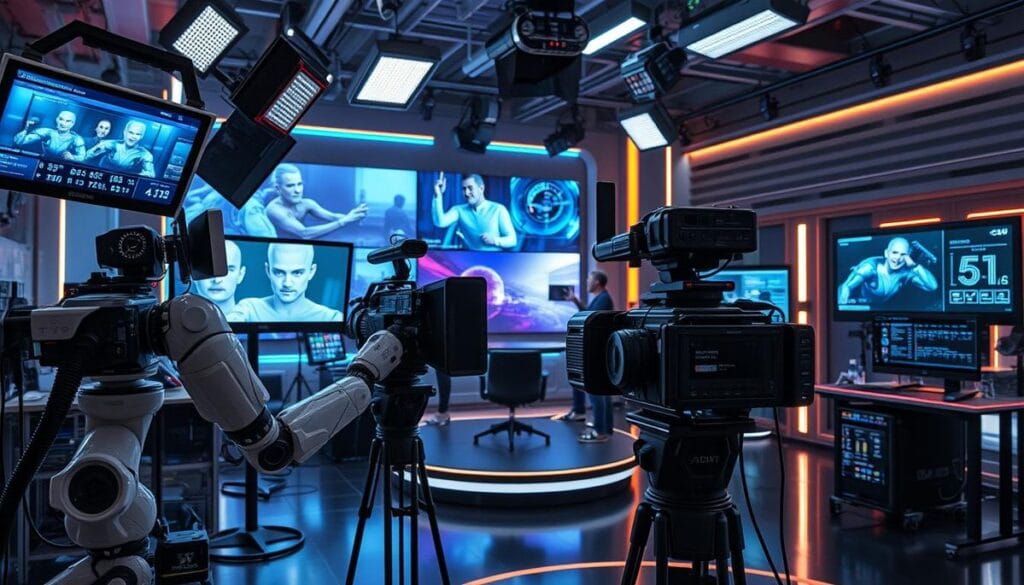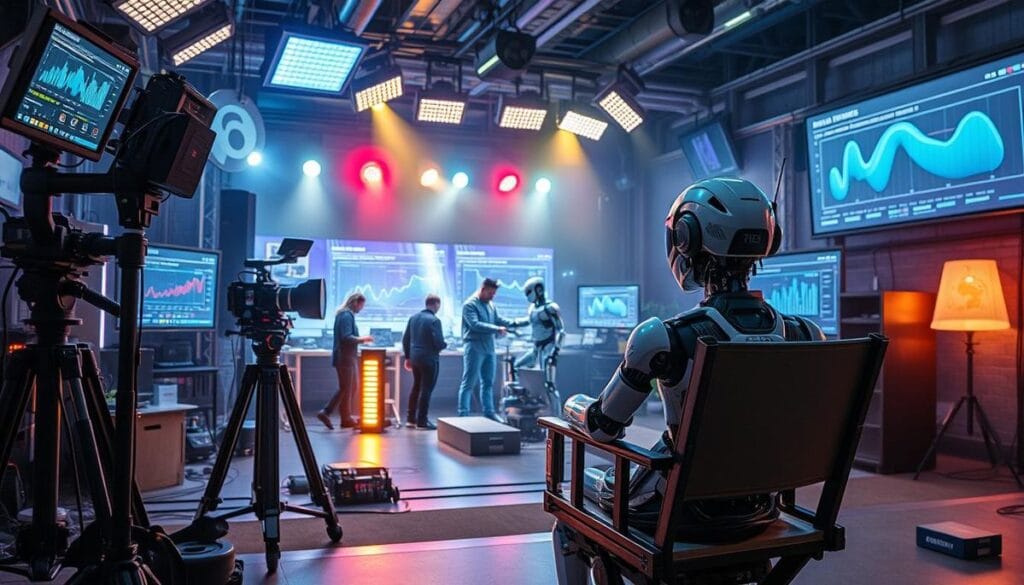Have you ever wondered what happens when cutting-edge technology meets cinematic storytelling? Welcome to the world of AI in film industry, where algorithms don’t just automate, they create, edit, and even inspire. From generating scripts in seconds to de-aging actors flawlessly on screen, AI is no longer just behind the scenes. It’s becoming the unseen co-director of Hollywood’s biggest blockbusters. As artificial intelligence reshapes every frame, the future of filmmaking has never looked this futuristic, or this fascinating.
Introduction to AI in Film
Artificial intelligence is transforming every aspect of cinema. From big‑budget blockbusters to indie movies and tv shows, using ai in film reshapes storytelling and production. Filmmakers now rely on ai technology and generative ai to streamline processes, reduce time and resources, and automate tasks that once demanded manual labor. In this new film industry, ai’s role becomes essential as a tool for filmmakers. And as a result, the future of ai in filmmaking is both exciting and challenging.
What Is Artificial Intelligence in Filmmaking?
Artificial intelligence refers to software and ai systems that mimic human creativity, using ai algorithms and machine learning models. The use of ai in filmmaking includes scriptwriting, casting, editing, visual effects, and even audience analysis. Within the industry, this ai film technology can train ai models using massive amounts of ai training data to help content creators. As a result, ai-generated scenes sometimes reduce labor costs and speed up film production.
How AI Is Shaping the Film Industry
Ai in film industry disrupts traditional studios and media industries. It enables automation across different stages of filmmaking—from pre-production to post-production. For example, tool in filmmaking such as deepfakes and voice synthesis can enhance visual storytelling with less effort. Independent filmmakers and industry leaders both adopt used ai tools. Moreover, ai may help predict audience reaction based on data, thus influencing distribution and marketing in film and tv.
Why the Future of AI Matters in Cinema
The future of ai promises films that blend human creativity with machine efficiency. As cinema like never before embraces ai, actors’ likenesses can be digitally recreated or voice‑cloned, raising ethical concerns about consent and deepfakes used without their consent. Nonetheless, innovation continues: ai film festival in los angeles showcases projects where artificial intelligence collaborates as a creative partner, examining ethical ai boundaries and reshaping the film landscape.
Did you know octopuses have three hearts, and two of them stop beating when they swim?
Tools and Technologies Used in Films

AI software serves as a powerful tool in filmmaking today. Filmmakers leverage ai tools like Respeecher or generative ai engines to recreate voices or faces, and utilize machine learning for script analysis and visual effects. This ai use enhances creativity and speeds production, giving both big-budget blockbusters and independent films new capabilities. And yes, ai is already used in films shown at major film festivals, proving its growing influence.
AI Software as a Tool in Filmmaking
Filmmakers adopt ai toolsets that generate scripts, storyboard visuals, or automate editing. A popular ai generator, ChatGPT or others, assists writers to brainstorm scenes or dialogue. These tools reduce repetitive tasks. Moreover, automated voice cloning can help recreate actors’ voices ethically or improve dubbing. The increasing presence of ai in filmmaking makes cinema more agile and innovative.
Deepfake and CGI Powered by AI
Machine learning enables deepfakes and ai-generated CGI that appear lifelike. Studios train ai models to replicate facial movements of human actors for stunning visuals. Deepfakes and visual effects created via ai technology reduce reliance on physical sets. However, filmmakers must weigh ethical boundaries, especially regarding reproducing human touch or actors without their consent. This use of ai in cinema both excites and provokes debate.
Machine Learning in Scriptwriting and Editing
Using ai algorithms, machine learning can analyze script structure and recommend rewrites. Filmmakers now use ai systems to predict pacing, emotional arcs, and audience response. Automated editing tools can cut scenes more efficiently, optimize pacing, and highlight continuity issues. This ai filmmaking process saves time and supports creative storytelling. As a result, creators can focus more on narrative and less on repetitive tasks.
AI in Cinema Production
In pre-production, ai enhances planning and budgeting by generating schedules and storyboards automatically. It predicts shoot duration and recommends optimal locations. Using ai in film production improves efficiency and cuts costs. Filmmakers and planners can automate logistics and allocate resources intelligently. This use of ai as a tool for filmmakers streamlines coordination before cameras roll.
Read also Fairphone 5 Review
How AI Enhances Pre-Production Planning
During pre-production, ai systems help craft shooting schedules, scout talent, and model sets in virtual environments. Using ai technology, producers can visualize sets, save time and resources on location scouting, and simulate lighting effects. The automation brought by ai may redefine traditional workflows. Thus, ai in film production supports smarter, more cost-effective filmmaking.
Using AI for Casting and Character Modeling
Casting directors and filmmakers use ai algorithms to suggest actors based on appearance, delivery style, or demographics. Generative ai can even produce virtual characters with unique traits. This type of ai use speeds casting decisions and supports diversity. It also offers new options for integrating ai-generated characters into cinema without sacrificing authenticity.
Did you know your phone’s blue light can disrupt your sleep more than you think?
AI in Visual Effects and Scene Design
In post-production, ai’s visual effects tools generate realistic environments, de-age actors, or animate creatures. Ai-generated landscapes allow filmmakers to imagine worlds beyond budget constraints. Advanced ai systems support rendering at high detail with fewer resources. This creates potential for studios and independent filmmakers alike to compete visually.
Storytelling and Creativity with AI
Ai film technology doesn’t replace human creativity—it enhances it. Ai-generated scripts or storyboard suggestions provide a foundation, but filmmakers refine them using human touch. Artistic vision remains central. In blended collaboration, ai could help create diverse narratives faster, while human writers and directors maintain emotional depth. This synergy makes cinema dynamic and forward-looking.
Can AI Create Original Movie Scripts?
Generative ai models can draft original scripts by learning from vast amounts of stories. They produce dialogues, plot arcs, or scene outlines. Yet, human writers must refine drafts to ensure cultural nuance, emotional resonance, and narrative coherence. Thus, ai may offer starting points, but creative polish remains in human hands.
AI as a Co-Writer or Creative Partner
Many filmmakers now use openai tools or ai generators to brainstorm scenes or revise scripts. The ai use encourages collaboration rather than replacement. Creative writers treat ai as a co-writer, editing and adapting ai-generated suggestions. This hybrid approach balances efficiency and creativity, bridging synthetic logic and human feeling.
Balancing Human Emotion and AI Logic
Human creativity must guide ai’s logical suggestions. Ai-generated ideas often lack emotional subtlety. Filmmakers must balance technical recommendations from ai with authentic emotional arcs. This AI storytelling approach ensures films remain touching, relevant, and artistically meaningful.
Impact on the Film Industry

AI changes job roles across the film industry. It automates tasks in editing, data analytics, subtitles, or visual effects. While job displacement is a concern, new ai roles emerge in training ai models, managing automation, or supervising ethical compliance. Traditional studios and media industries adapt by retraining staff and redefining creative workflows around ai systems.
Read about Enterprise Technology Solutions
How AI Changes Jobs in Filmmaking
Automation with ai may reduce demand for some manual tasks, but creates opportunities in ai training data, model oversight, and ethical ai design. Filmmakers and technicians shift toward strategic roles. Industry leaders now invest in cross‑training teams to work alongside ai systems. This evolution supports both innovation and job sustainability.
The Role of AI in Film Distribution
Using ai tools, distribution platforms can predict box office performance, recommend targeted promotions, or customize trailers for different audiences. Ai use in distribution enhances efficiency and reach. Studios leverage these systems to optimize release strategies and maximize audience engagement across markets.
Did you know the largest living organism on Earth is a mushroom in Oregon, covering 3.4 square miles?
Ethical Questions About AI in Cinema
As ai in film grows, filmmakers face ethical concerns about consent, deepfakes, and data privacy. Using actors’ likenesses or voices without permission raises serious questions. Filmmaking regulators and creators consider establishing ethical ai boundaries. These conversations are crucial for responsible innovation within the entertainment sector.
The Future of AI in Filmmaking
Overall, the future of ai in filmmaking promises powerful collaboration between technology and human creativity. Ai-generated films might become feasible, but human directors and writers likely remain central. The future of ai will influence training, production, and distribution, creating a new era in film and tv creation.
Will AI Replace Directors or Writers?
AI in film isn’t likely to fully replace directors or writers. Ai tools support ideation and logistics, but directors bring vision, and writers infuse emotion. Human touch remains irreplaceable. Ai’s role is companion, not replacement, ensuring stories still resonate.
The Rise of Fully AI-Generated Films
While ai-generated shorts and experiments appear, full-length ai-generated movies remain rare. Many rely on hybrid production—humans refine ai-generated footage. This cautious approach acknowledges ai may assist, but not dominate storytelling. Festivals like the ai film festival in los showcase these projects as early steps.
Embracing AI as the Future of Filmmaking
In conclusion, filmmakers should embrace ai to enhance creativity, scale production, and innovate new forms. With ethical ai practices, they maintain artistic integrity while benefiting from technological advances. The future of ai lies in synergy—with human creativity steering the process and ai powering efficiency.
Frequently Asked Questions about AI in film industry
How is AI affecting the film and television industry?
AI is reshaping film and television through automated editing, AI voice cloning, and character animation, which reduce production time and costs. Additionally, deepfake detection improves content integrity, while AI film budgeting helps studios plan efficiently.
How is AI used in the film industry?
Studios use AI for casting, script analysis, and even screenwriting tools that help polish dialogue. It also powers AI-generated trailers and enhances automated editing, making workflows faster and more precise.
Is AI a threat to the film industry?
While AI boosts creativity, many filmmakers fear it threatens originality by overusing AI-generated content and synthetic voiceovers. Moreover, writers worry that AI screenwriting tools could replace human storytelling.
Can AI replace the film industry?
AI may simulate parts of filmmaking like character animation or voice cloning, but it cannot replace human emotion or vision. Instead, it should support, not substitute, the creative core of cinema.
We’ve reached the end—but your journey doesn’t stop here. If even one fact made you raise an eyebrow or smile, imagine what else is out there waiting for you to explore. Share your favorite part, tag a curious friend, or drop a fun fact of your own in the comments. Let’s keep the curiosity going—because learning is way more fun when we do it together!
Read also about MOVEit Data Breach